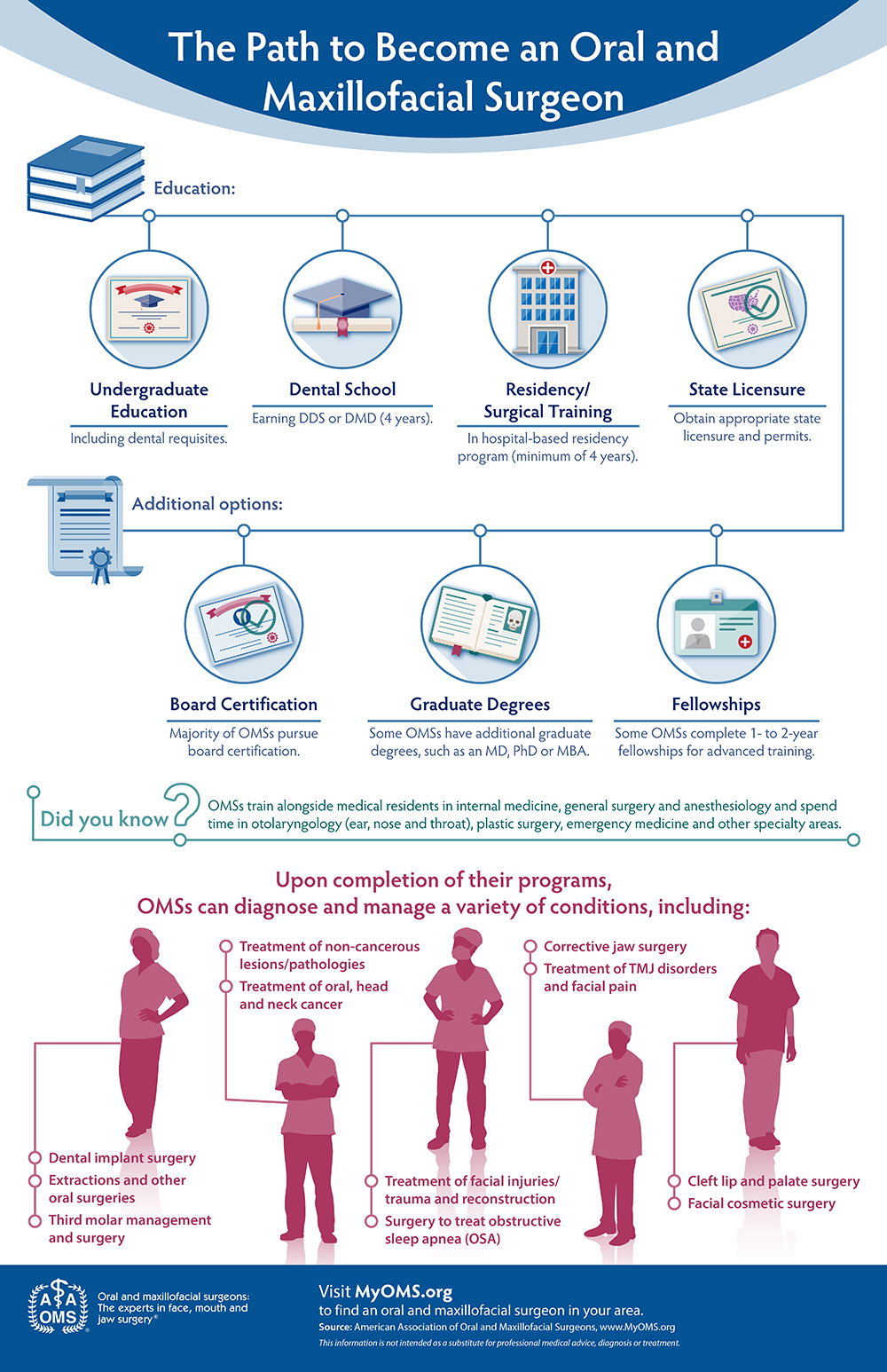You generally meet an oral and maxillofacial surgeon under difficult circumstances. You may have suffered a serious traumatic injury to your face. Maybe some teeth were knocked out, or your nose was broken. A disease process may require the extraction of some teeth, or you may need a procedure to correct a congenital problem such as a cleft palate.
You can rest assured that the oral and maxillofacial surgeon has received rigorous training not only in the repair of your oral or facial problem but in providing you the sedation or anesthesia you need to make it through whatever procedure is required.
What Is Oral And Maxillofacial Surgery?
According to the American Dental Association, “Oral and maxillofacial surgery is the specialty of dentistry which includes the diagnosis, surgical and adjunctive treatment of diseases, injuries and defects involving both the functional and esthetic aspects of the hard and soft tissues of the oral and maxillofacial region.”
This means that an oral and maxillofacial surgeon fixes any problems with facial structures involving the mouth, jaws, teeth, cheeks, and noses. Basically, any issue involving your face that needs repair will be repaired by an oral and maxillofacial surgeon (OMS).
What Types Of Procedures Do Oral And Maxillofacial Surgeons Perform?
An oral and maxillofacial surgeon is often called in the event of an emergency when there has been a traumatic injury to the head and face. These surgeons are trained in providing anesthesia and deep sedation which may be required for some difficult and potentially painful procedures.
Some areas for which the skills of an OMS are required include, but are not limited to the following:
Reconstructive surgery due to illness. A person may have a cyst or tumor. The tumor may even be cancerous which must be removed and may require reconstruction of the jaw.
Replacement or removal of teeth. Numerous situations (poor oral hygiene or neglect, oral/facial injury, side effects of some medications) can cause the structure of the teeth to weaken so they need to be replaced. Wisdom teeth often need removal. The extraction of impacted teeth is often required, as is the removal of teeth for which there is no restorative hope. OMS are the experts in replacement of missing teeth with dental implants, as well as reconstruction of bony defects (to allow for future implant placement or other dental appliances/prostheses) in situations where significant loss of the bony architecture and volume of the jaw bones(s) has occurred as a result of teeth that have been missing for a prolonged period of time and/or trauma.
Repair of trauma to the face. A car accident is a frequent cause of trauma to the face that needs repair by an OMS. Falls or being hit in the face can cause enough facial damage to require the services of an OMS.
Reconstructive surgery for other conditions. Some OMS specialize in the correction of congenital craniofacial malformations such as a cleft palate or cleft lip. This treatment is considered medically necessary and is not cosmetic surgery. The same is true of surgery to correct misaligned upper and lower jaws (orthognathic surgery), and temporomandibular joint (TMJ) problems where surgery is required to restructure the hinge of the jaw which is causing the person pain.
Cosmetic surgery. Oral and maxillofacial surgeons (OMSs) are well-qualified to perform cosmetic procedures involving the functional and esthetic aspects of the face, and some OMS even pursue fellowship training in Facial Cosmetic Surgery after completion of OMS residency in order to further sub-specialize in facial cosmetic surgery. Extensive education and training in surgical procedures involving skin, muscle, bone and cartilage during OMS residency provide the oral and maxillofacial surgeon with the expertise to understand the need for harmony between facial appearance and function. More information on cosmetic facial procedures that OMS are capable and trained to perform can be found here: https://myoms.org/what-we-do/facial-cosmetic-surgery/
How Does a Person Become an Oral and Maxillofacial Surgeon?
It is not easy to become an OMS. The first step is to complete college (obtain a Bachelor’s degree). Then, on to dental school, which is another four years following college to obtain the training needed in order to diagnose and treat basic mouth and tooth problems.
The next step is to enter specialty training. This is a highly competitive field and not every dentist who wants to become an OMS is accepted into a residency program for advanced training. This rigorous hospital-based specialty program takes between four and six years, and requires successful completion of multiple non-OMS rotations alongside their medical colleagues (General and Pediatric Surgery, Trauma Surgery, Emergency Medicine, Internal Medicine, Cardiology, Anesthesiology) in addition to the core disciplines within Oral and Maxillofacial Surgery. OMS who opt for the 6-year track also complete medical school and obtain their medical degree (M.D.). Following successful completion of OMS residency, most (but not all) OMS pursue Board Certification by the American Board of Oral and Maxillofacial Surgery which requires that candidates pass two comprehensive and intensive examinations (written and oral) in succession.
This specialty is one that truly “bridges the gap” between dentistry and medicine.
How Does An Appointment With An Oral And Maxillofacial Surgeon Work?
-
- Before any surgical procedure (oral surgery or otherwise), it’s vital to been seen by the surgeon/doctor for a consultation. Your initial consultation is a chance for you to learn more about your upcoming procedure and ask any questions that you may have. It’s also a time for your doctor and staff to get the information they need from you, and to discuss all of the anesthetic options that an oral surgeon can provide to make your procedure as pleasant and comfortable for you as possible. Most conditions can be performed by an OMS in the comfort and convenience of their office, but some situations may necessitate that the procedure(s) be completed in an operating room setting in a hospital or outpatient surgery center. All of this preparation and discussion is why a consultation (BEFORE any treatment is rendered) is crucial and necessary.
- Once you have been evaluated and assessed by the doctor, and treatment options for your specific situation and diagnosis have been discussed, we make a treatment plan just for you so that you know what your anticipated out-of-pocket costs will be (after insurance benefits have been applied). Please call (704-246-6051) or email us (oralsurgery@waverlydentalgroup.com) to schedule your consultation appointment with Dr. Soung!




